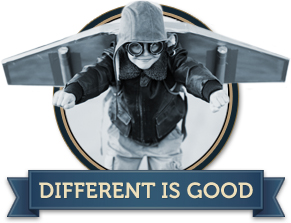To Fly, or Not To Fly – That Is The Question
Everyone evaluates their choices in life sooner or later, with varying frequency. Knee-deep in my second year of university, I find myself doing so about six times a day. Earlier this week, in the throes of existential angst, completely unrelated to any rampantly fluctuating hormone levels, I scoured the internet for, first, my personality type, and second, careers suiting my personality type.
I discovered that I was ESTP – Extroverted Sensing Thinking Perceiving – and heading the list of suggested careers for people like me, was “flight attendant”. Flight attendant? I felt betrayed! Why had the universe not imparted this vital piece of information to me before I signed up to slave away at college for four years? Think of all the wasted potential, rotting in classroom, never destined to soar in the skies as fate had apparently wanted. In an effort to palliate my indiscretion, I raked the internet for everything vital to my potential career in the aviation industry, pronto.
Flight attendants have mixed feelings about their jobs. Reviews oscillate from amazing, to horrible, to “I ran away to law school as soon as I could”, but everyone agreed that to make it big, you had to be tenacious, a smooth talker, and as adaptable as possible.
The first straw seems to be the working hours. Rookie flight attendants have no fixed schedules, and are called in as and when the airlines encounters an opening in their staff: rather like intensivists and neurosurgeons, they’re required to be “on duty” while on the bench.
Straw two is the salary – like intensivists and neurosurgeons, a flight attendant’s salary is proportional to his/her years of experience, but about a tenth of the good doctors’. The final straw – and possibly the one with most weight – is the snappy, irritable, entitled clientele.
Stories of bossy mothers, wailing children and rude men are as common in the industry as trees are in the forest. Nevertheless, for every dissatisfied employee, is another veteran air host/hostess gushing about his/her long, pleasant tenure. Flight attendants explore the world, meet new and interesting people, and live life out of overnight bags. If you’re a people-person, and you live to travel, and don’t mind traveling to live, this is the career for you.
The duties of a steward/stewardess last about twelve hours at a stretch (subjective to flight duration) and include demonstrating safety measures, keeping passengers informed, checking up on passengers and the pilots, making sure sustenance is found aplenty, aid in case of evacuation, conduct periodic flight checks, administer first aid when necessary, take special care of children and the elderly traveling alone, take inventories, and supervise the food chain.
Originally clothed with purely functional intentions, airlines now capitalize on the large number of female applicants. Khakis and hats have been replaced by dresses and skirts. Indeed, airlines such as Emirates, Air India and Singapore Airlines have traditional uniforms: a hijab, a sari, and an ethnic tunic, respectively. Professional turnout is insisted upon, and visible tattoos and piercings are not condoned.
Different carriers have different requirements for potential flight attendants, but the base line is graduating high school, college degrees in communication favored. National carriers look for citizenship, and all carriers insist on height-weight coordination. New recruits are sent to bootcamp at the airlines’ hub, for about a month before deployment.
Upon graduation, they undergo practice flights before being licensed to work on aircrafts. Flight attendants follow a hierarchy: the small fry are essentially substitutes for their first few years, but with seniority comes the right to pick assignments and working hours. The perks of being a flight attendant are varied, and include heavily discounted vacation, heaps of travel, and the opportunity to help people, as is evident in both the job description, as well as the heroic deeds the cabin crew perform during times of emergency, cases in point being the brave men and women aboard United Airlines Flight 175, United Airlines Flight 93, American Airlines Flight 77 and American Airlines Flight 11 – the four aircrafts that were hijacked on September 11, 2001.
Despite the hazards, an increasing number of people aspire to be flight attendants, and no wonder, given the amount of travel, the amount of free travel, and the days off (though they may come in random bursts). To apply, aspirants need to fulfill the requirements of the airline they want to work for, sit through an interview and then proceed to brutally outstrip all the fierce competition.
Personally, I love airplanes – all shapes, all sizes, all firepower – and impending journeys make my blood sing. Though I generally tend to dismiss the air host/hostesses in favor of piling admiration upon the pilots, I will acknowledge that the flight attendants live interesting lives, too – which, considering that they have been named my first best destiny, I suppose I shall have to concede on principle alone.
While I will not going (to my knowledge) be dropping out of school any time soon, it is a comfort that cannot be expressed in mere words to know that in the event that I did, there is ostensibly a job that I’m perfectly suited for that doesn’t mandate an undergraduate education.




